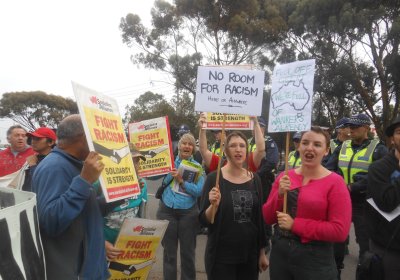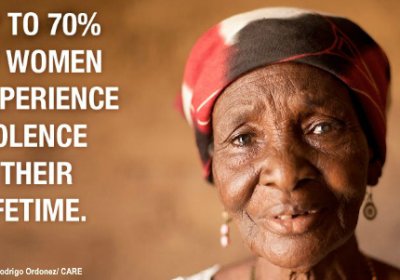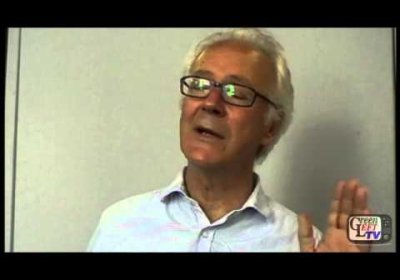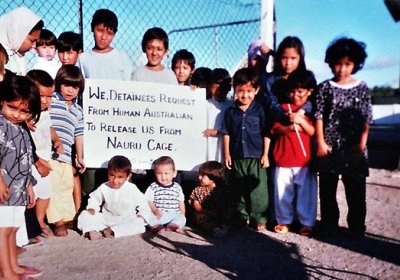Over the past couple of weeks, Green Left Weekly has been collecting recollections, images, impressions and analyses of the biggest-ever globally coordinated anti-war protest in history: the 30 million-strong February 14-16, 2003, marches against the launching of the US-led invasion of Iraq.
It was such a tremendous explosion of popular protest that it prompted New York Times columnist Patrick Tyler to write at the time there were perhaps “two superpowers on the planet — the United States, and worldwide public opinion”.
955
Geert Wilders called off his February 20 public meeting in Perth after the hotel where he was going to speak cancelled his booking.
Organisers of Wilders' tour tried to claim that protesters had intimidated the hotel and implied that Wilders' "free speech'' was threatened as people were "denied'' the chance to hear Wilders talk.
Wilders' most prominent supporter in the Australian parliament — disgraced Liberal senator Cory Bernardi — also tried to claim that there was "free speech double standard" involved.
The warnings were clear and now it’s happened: bending over backwards with carbon tax compensation to appease Australia's dirtiest electricity generators, the Gillard government has handed big coal billions in windfall profits, whilst consumers are effectively paying twice for the carbon price.
In an attempt to avoid anti-racist protesters, the February 18 meeting to launch the Australian speaking tour of Dutch far-right politician Geert Wilders, was, at the last moment, moved to a desolate, non-residential part of Somerton on Melbourne’s northern edge. More than 200 anti-racists, however, picketed Wilders’ meeting while another 100 protested in Melbourne CBD, where one of the speakers was Greens Senator Richard Di Natale.
A professional athlete; a home with an arsenal of firearms; a dead young woman involved in a long-term relationship with her killer.
In November, her name was Kasanda Perkins and the man who shot her was Kansas City Chiefs linebacker Jovan Belcher. Now her name is Reeva Steenkamp, killed by Olympic sprinter and double amputee Oscar “the Blade Runner” Pistorius.
Angry residents from Kemps Creek and surrounding neighbourhoods packed the local sports and bowling club auditorium on February 18 to protest against the state government’s plan to dump radioactive waste in the area.
The NSW Liberal government is proposing to shift 5800 tonnes of soil from an area in Hunters Hill, where a uranium ore processing plant once stood, to the Kemps Creek SITA dump site.
Cancer clusters have been detected in Hunters Hill, which have been linked to the contamination left behind at the former plant site.
The first day of NSW parliament this year was met with a strong protest against the announced shortening of the heavy rail line to Newcastle.
Organised by Save Our Rail, a large contingent boarded the 8:03am express from Newcastle Station. Supporters saw them off, while others hopped on at outer stations.
Leaflets were distributed and petitions were signed as activists explained to the other passengers what the state government was proposing. The media were regularly on the mobile phone to Save Our Rail president Joan Dawson.
Hall Greenland, a respected left-wing activist, writer and journalist in Sydney, is the Greens candidate for the inner-west Sydney seat of Grayndler.
Simon Butler was a 25-year-old activist who helped organise the mass mobilisations in Sydney in February and March 2003 against the invasion of Iraq. He was also a leader of the socialist youth group Resistance and the student anti-war movement Books Not Bombs, which Resistance initiated.
Lip-stitching and attempted self-immolation are among increasingly extreme acts of self-harm taking place in Australia’s two offshore detention camps in recent weeks.
Hunger strikes, cutting and attempted hangings have already become widespread in the tent city on Nauru. But, on February 19, for the first time since the “dark days” of former prime minister John Howard’s “Pacific solution,” refugees stitched their mouths closed to protest their arbitrary and indefinite detention.
When NSW members of parliament from both Labor and Coalition start campaigning against coal seam gas (CSG) — and the federal Labor Party starts musing that it might impose “strict regulations” on state governments to control the industry — you know that the movement against this dirty fossil fuel is starting to pack a punch.
CSG was hardly known two years ago. Today, the thought of it frightens people. Gas companies have poured millions into advertising to reassure people that the industry is safe — but it hasn’t worked.
The National Tertiary Education Union released this statement on February 19.
***
National Tertiary Education Union (NTEU) members at the University of Sydney have voted overwhelmingly in favour of taking industrial action over their claims for a new Enterprise Agreement.
The ballot for protected industrial action was counted and declared on Friday afternoon. Over 1000 members voted.
- Previous page
- Page 3
- Next page











